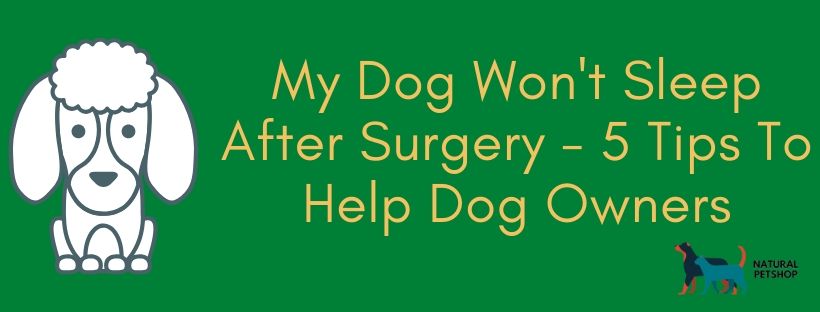
Dog behavior after surgery – Dog after surgery what to expect, planning and time
Still wondering why my dog won’t sleep after surgery? Let’s face it; any of us feel concerned when any of our loved ones have had surgery. They may have been in an accident; it could be a health issue that has hit suddenly; or it could be a health issue that has been around for a while.
There is the diagnosis, the surgery and then the recuperation phase and the longer-term prognosis.
I have found some really good results with Okoa Pet’s CBD infused dog treats for relaxation and their CBD mobility dog treats work really well too.
Our human loved ones are not necessarily the only important ones to consider. Those of us with animals usually find it extremely upsetting when a pet has had to have surgery.
So much of what is going on is difficult and distressing because of inability to communicate between us and the animal. In this Blog Post we are specifically going through some of the questions from readers who tell us that “My dog won’t sleep after surgery”.
Most of us with dogs tend to overcompensate when it comes to love, comfort, toys, food, etc. and that can be from a cheaply priced pig’s ear chew, right through to a high quality supportive dog bed.
I wouldn’t be the first person to have a $2 meal of instant noodles while my dog is having one of the awesome meals from our Homemade dog food recipes;
What we aim to do with this post is provide a few tips to help you in those post-surgery days; how to handle your dog’s whining given the communication difficulty and how to handle their depressed state.
We suggest CBD products for dogs, also look into pet insurance if you are in the USA as a precaution.
My dog won’t lay down after surgery
It can be so difficult to watch your dog in pain post-surgery and given how much they sleep at that time it accentuates in our mind their pain level when they are awake.
In particular just watching them attempt to get comfortable is hard and it is no wonder that they won’t lay down after surgery.
We have probably all been there watching our dog walking around and around multiple times before they finally make an attempt to lay down. These whimpers of pain can break anyone’s heartstrings.
It is not just getting them to lay down that is the issue, as we get many customers feedback telling us “My dog won’t sleep after surgery”. The two are related of course, but the following 5 Tips may help you.
FAQ – My dog refuses to lay down after surgery, 5 tips to help
Tip 1 How to tell if your dog is in pain
Firstly, you need to determine that your dog is in pain. There can be both physical and/or emotional pain. Some of the telltale signs are:
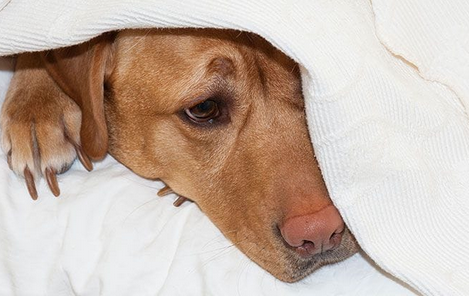
Physical signs of pain
- Trembling, shaking and/or panting.
- Grooming themselves less often or less effectively.
- If you dog can’t or won’t lay down on the side of the incision. They may try an alternative side more often than not.
- Not want anything to eat or drink.
- Looking at their incision marks, or the urge to do so.
- Not having any strength or desire to walk, even for a short distance.
- An increase in body tension or flinching even with a gentle touch.
Emotional signs of pain
A change in your dog’s behavior is the most common sign of pain. These signs can include:
- If they are acting more subdued than normal.
- An abnormal posture.
- Aggression.
- Toilet accidents; in particular urinating inside.
- Restlessness.
- Hiding in dark, quiet places.
- Less interaction with other pets and family members.
- It is not uncommon for anxiety rather than pain to be the cause of the dog being vocal or struggling when being touched or stroked in the first couple of days post-surgery.
All of the above can be strong contributors to that question; “My dog won’t sleep after surgery”.
Never be too afraid to give your Vet a full rundown on your dog’s health post-op.
They are professionals who have seen and heard it all and would rather you share a few minutes updating them than leaving out something that could be important.
Tip 2 Medication and follow ups.
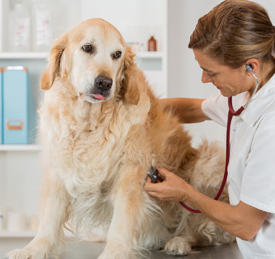
- It may seem obvious to always give your dog the prescribed medication, for the period instructed and attend any follow ups with your Vet or Pet Hospital. They are the professionals and it’s important we listen to and follow their advice.
- However, it is up to each of us as dog owners to monitor our dog’s health and behavior while at home. Some medications can result in gastrointestinal issues, while more rarely others have been known to result in renal or liver issues.
- Keep a close eye on all of these things as well as general lethargy, vomiting, anorexia, diarrhea and depression. Contact your Vet immediately if your dog is showing any signs of worsening post-op.
- Post-operative treatment is also important; removal of stitches, physio, massage, etc. Always keep your Vet informed about the behavior of your dog at home. It is a good idea to keep a health journal for your dog during this period.
- Double check your pets medical record if you have adopted recently.
Tip 3 The home environment is important
- Keeping the home environment free of hazards etc. is also important. However, we can overlook things ourselves and it can be beneficial to have a friend or relative cast a fresh set of eyes to make sure everything will help make your dog feel safe and comfortable.
- Bearing in mind that one of those most often heard questions is “My dog won’t sleep after surgery”, it may be important to assess your dog’s bed. Depending on the age of your dog, the seriousness of the surgery, or the future prognosis for your dog’s health it may be that you need to upgrade to a high quality supportive dog bed.
- Often an owner will keep their dog in a different area in the period immediately after they get them home, post op. Slips and trips can happen in this period so invest in some cheap rugs to put under their bedding. The last thing you want is for your dog to hurt themselves or to lose confidence.
- You may have to raise your dog’s water bowl and food bowl so that they don’t have as far to reach during this period.
- Keep any blankets or towels used at this time washed and changed regularly, so that your dog feels comfortable and you are lessening any germs/bugs etc. on their bedding.
- I would suggest no off-leash activities for the first week back home post-op.
Tip 4 Bowel movements matter
- If you have ever had any form of surgery that resulted in an overnight hospital stay then the likelihood is strong that a nurse will have asked you, “Have your bowels moved” as a part of their daily rounds.
- The reason for them asking that question is an important one; it is letting them know that your system is working as intended. Also, it alerts them to keep a close eye on you if they haven’t moved as it can be very painful to pass a bowel motion when you are badly constipated.
- It is also important that you monitor your dog’s bowel movements; not just for regularity, but also for consistency, smell, colour and to make sure that there is no evidence of blood in their stools. Seek immediate help from your Vet if your dog is constipated and/or if there is evidence of pain or bleeding.
- Keep an eye out too to ensure that you dog hasn’t defecated in the house. If your dog has used a dog toilet mat or a litter box, then it could be a good idea to set this up inside, such as in your laundry or garage if you have internal access from your home.
Tip 5 How to contain your dog inside when they are normally kept outside
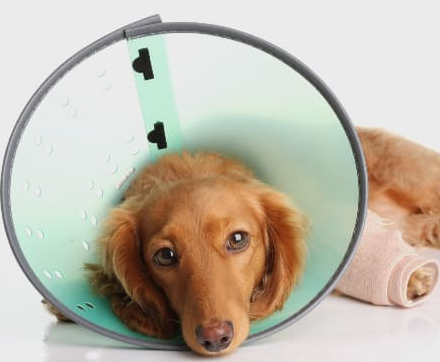
- To help prevent infections and/or your dog biting or scratching at their sutures it is best that you keep your dog inside for several days after getting them home.
- Don’t be tempted to groom your dog at this stage as that should wait until the sutures have been removed.
- I’m not a big fan of using an e-Collar on my dogs. However, when we come back to that question, “My dog won’t sleep after surgery” they have a definite place. In particular, they can be useful to help prevent your dog from licking the suture line as often they are itchy during the healing stage.
- The last thing you want is for the dog to open up the suture line and risk infection or even further surgery.
- Having an outdoor dog inside the home can potentially cause a few issues. Often the best solution is containment in the most practical way that you can. Some people suggest keeping a small dog in a cage while healing and larger dogs contained within a room such as a laundry.
- Personally, I think keeping a dog in a cage can add to that anxiety in your animal. I would rather keep any outside dog contained within the laundry, using something like a baby gate to prevent the animal from leaving the laundry.
- Make sure that the dog cannot escape from that containment room, especially if excited to see other family members, or if you have to answer the front door.
- This could be a good time to introduce your dog to a high quality supportive dog bed so that they have adjusted to it before they are well enough to go back outdoors again.
What to do when you have dog post-surgery whining
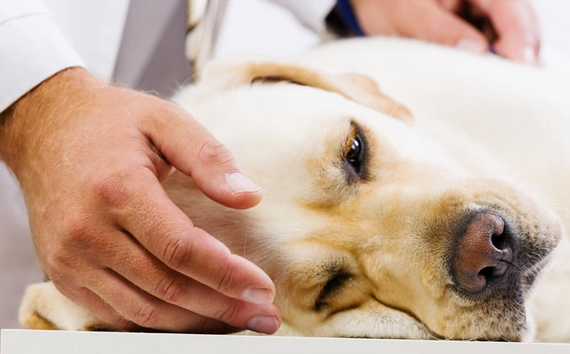
Here’s that question again; “My dog won’t sleep after surgery”, and in many cases it is paired with some serious post-surgery whining.
You may have tried holding them, comforting them, even getting them a high quality designer dog bed for extra support and comfort. However, nothing you do seems to have an effect.
It is only natural for us to stress or worry when our dog is whining, particularly if that was not normal behavior pre-op. In many cases the cause can actually be the dog’s reaction to the anesthesia.
Every dog is different and so too is their reactions to the anesthesia used. Because of this the effects can last different lengths of time with each dog.
The age of your dog can mean that they are more susceptible to whining post-op; with very young and older dogs falling into that scenario.
The weight of your dog can also have an impact on how the anesthesia effects impact on your dog.
Often it is a leaner dog that can be impacted by the anesthesia greater than a dog with a larger frame, carrying more weight.
Some of the after effects of anesthesia include:
- Lack of interest in food and water.
- Nausea.
- Grogginess.
- Shivering, and the effect of seeming cold.
- Nervous system control, affecting balance and depth perception.
It is most common for the whining to be as a result of the symptoms listed above. Generally the whining has eased in 1-2 weeks, but see your Vet if this is persisting.
How can I help with dog depression after surgery
Do dogs get depression you ask? Yes; they sure do. Once again it is one of those situations where people ask us what to do, as “My dog won’t sleep after surgery”.
Most of us are guilty of trying a range of things to keep our dogs happy; throwing a ball, taking them for a walk or swim, buying them some new toys or even a high quality supportive dog bed for extra support and comfort.
Try making them their favorite treat from our recipe book; The top 10 homemade dog treats recipes vet approved Australia.
Maybe you have tried some, or all of the above yet you still can’t seem to help your dog with depression post-surgery.
However, it is not unusual for a dog to feel a bit depressed in that situation and on the flip-side it is only natural for us to worry when we see them upset.
However, these are some of the influences that can impact on a dog’s mood post-op:
Hormones
These can impact greatly on the emotional state of your dog. Depression can hit them following surgery; a common example being straight after getting them de-sexed.
Medications
Once again, the effects of anesthesia can impact on your dog’s mood, but so too can any medications that they have been sent home with post-op.
Stress
Surgery can be very stressful for your dog; being unwell, unfamiliar people around them in the Vet Clinic/Pet Hospital. As a result, the dog can actually be emotionally overwhelmed when they eventually see you and get home again.
E-Collars
I mentioned these earlier in this Blog, however then can be quite upsetting for some animals, even though you have put it on them in their best interests – so that they cannot lick or bite their wound and/or sutures.
Discomfort
Dogs will usually be in some pain and discomfort following surgery.
Usually this is managed by medications prescribed by the Vet/Pet Hospital. Although these are prescribed to minimize pain while the dog heals, they can also cause the dog to be depressed.
Most dogs start to feel better in a few days or weeks at most, and this varies from dog to dog.
Things that can cause this variance can be the age of your dog; their mental state pre-op and what actual surgical procedure was performed.
Monitor their mental state following the surgery and if there is improvement, then keep looking for further improvement.
If you have any concerns then please discuss these with your local Vet.
- Product on sale
 Snooza Deluxe Car Travel Dog Bed, Waterproof with Reversible Cushion, GreyOriginal price was: $173.00.$157.99Current price is: $157.99.
Snooza Deluxe Car Travel Dog Bed, Waterproof with Reversible Cushion, GreyOriginal price was: $173.00.$157.99Current price is: $157.99.
Summary
One of the most commonly used things that we hear from customers is; “My dog won’t sleep after surgery”.
Like most of us with dogs, you have probably showered them with care, food, toys, love and a high quality supportive dog bed, special bowls, collars, etc.
Don’t worry, as you are not along. Hopefully this Blog Post has shown you just how normal this is, and how different things affect each dog.
Your dog already knows that it is loved, and that is the first step on the road to recovery post-sugery.




Just got my Bella home had very large tumor removed from belly area gave her pain medication however she cannot seem to lay down just standing and winning Please help
Hi donna,
Did this resolve or what did you do to try to help your dog? I’m in a similar situation, but my dog is a male.
thanks!
Jill
If you live in the USA, you can try CBD oil for dogs. https://mindiampets.com.au/recommends/cbddog/
This is a natural remedy that will calm own your pet and relieve anxiety.
My Scotty just had the same thing fine today .. a large tumor removed from his stomach . He is whining / panting and won’t lay down . I tried to get him to lie on his side and he almost tried to bite me . He had been given pain meds . I don’t know his to help him sleep . 😢